Related Research Articles

William Freeman Vilas was an American lawyer, politician, and United States Senator. In the U.S. Senate, he represented the state of Wisconsin for one term, from 1891 to 1897. As a prominent Bourbon Democrat, he was also a member of the cabinet of U.S. President Grover Cleveland, serving as the 33rd Postmaster General and the 17th Secretary of the Interior.
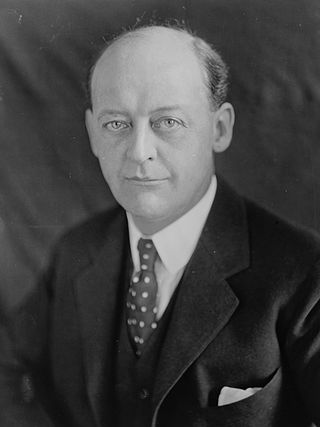
James Wolcott Wadsworth Jr. was an American politician, a Republican from New York. He was the son of New York State Comptroller James Wolcott Wadsworth, and the grandson of Union General James S. Wadsworth.
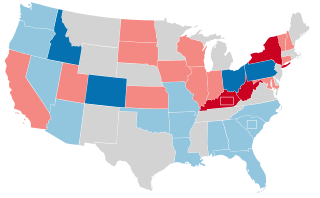
The 1956 United States Senate elections were elections for the United States Senate that coincided with the re-election of President Dwight D. Eisenhower. The 32 seats of Class 3 were contested in regular elections, and three special elections were held to fill vacancies. Although Democrats gained two seats in regular elections, the Republicans gained two seats in special elections, leaving the party balance of the chamber unchanged.

Nathaniel P. Tallmadge was an American lawyer, politician, and Wisconsin pioneer. He served two terms as United States senator from New York and was the 3rd governor of the Wisconsin Territory (1844–1845). Originally active in politics as a Jacksonian Democrat, he fell out with the party during the presidency of Martin Van Buren and eventually became a Whig.
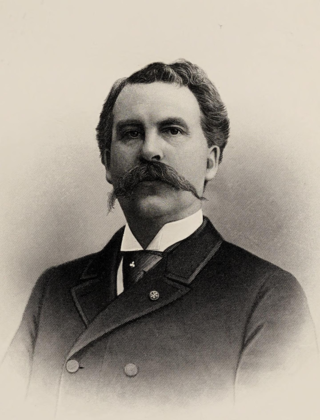
Joseph Very Quarles, Jr., was an American lawyer, politician, and Wisconsin pioneer. He served as a United States senator from Wisconsin and a United States district judge for the Eastern District of Wisconsin. Earlier in his career, he was the 20th mayor of Kenosha, Wisconsin, and served as an officer in the Union Army during the American Civil War.

William Herbert Adams was an American politician who served as the 25th governor of the state of Colorado, from 1927 until 1933.
James W. Murphy was an American merchant, farmer and politician who served as a Democratic member of the Wisconsin State Assembly from Marquette County and of the Wisconsin State Senate from Milwaukee County.
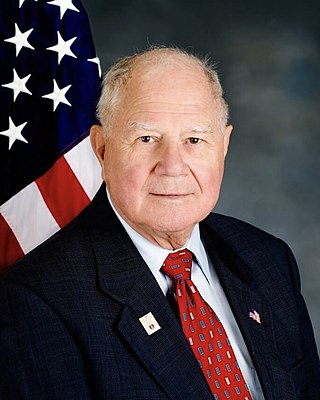
William J. Larkin Jr. was an American politician and retired U.S. Army officer from the state of New York.
The Wisconsin Progressive Party (1934–1946) was a political party that briefly held a dominant role in Wisconsin politics.

Carl William Thompson was an American lawyer and Democratic politician. He served 26 years in the Wisconsin State Senate and six years in the State Assembly, representing Dane County. He was an unsuccessful candidate for Governor of Wisconsin in 1948 and 1950.
Denison Worthington was a member of the Wisconsin State Assembly and the Wisconsin State Senate. His first name is sometimes spelled "Dennison" in historical documents.

Edward Keogh was an Irish American immigrant, printer, Democratic politician, and pioneer settler of Milwaukee, Wisconsin. He served 17 years in the Wisconsin State Assembly between 1860 and 1895, representing Milwaukee's 3rd ward, and was the 37th speaker of the Assembly. He also served two years in the State Senate.

John Adams was an American businessman, Democratic politician, and Wisconsin pioneer. He served three years each in the Wisconsin Senate and State Assembly, representing western Dane County. Adams founded the unincorporated settlement Adamsville, Wisconsin, now a ghost town.
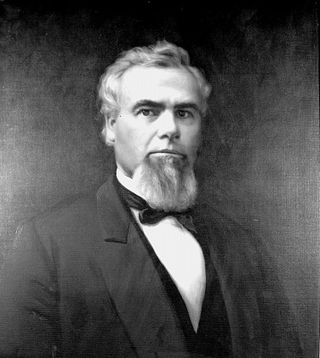
The 1873 Wisconsin gubernatorial election was held on November 4, 1873. Democratic Party candidate William Robert Taylor was elected with 55% of the vote, defeating incumbent Republican governor Cadwallader C. Washburn.
Senator Stanley may refer to:

The Eighteenth Wisconsin Legislature convened from January 11, 1865, to April 10, 1865, in regular session.

The Thirty-Seventh Wisconsin Legislature convened from January 14, 1885, to April 13, 1885, in regular session.

The Forty-Second Wisconsin Legislature convened from January 9, 1895, to April 20, 1895, in regular session. They convened again in special session in February 1896 to pass a legislative redistricting law.

The Forty-Third Wisconsin Legislature convened from January 13, 1897, to April 21, 1897, in regular session. They also convened in a special session from August 17 through August 20, 1897.

The Forty-Fourth Wisconsin Legislature convened from January 11, 1899, to May 4, 1899, in regular session.
References
- ↑ Biographical Sketches. Wisconsin Blue Book. 1885. p. 420 . Retrieved 2015-05-10.
William Stillman Stanley, Jr.+Wisconsin+Assembly.